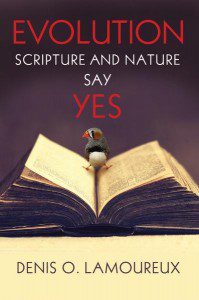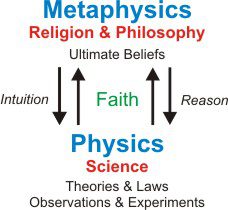 It is important as Christians that we move beyond the either-or thinking that dominates so much of the church, either we believe in evolution or we believe in God. This is a dangerous and false dichotomy. We have been working through Denis Lamoureux’s new book Evolution: Scripture and Nature Say Yes. The sixth and ninth chapter of the book focus on moving beyond the dichotomy, while the seventh and eighth look at Galileo and Darwin.
It is important as Christians that we move beyond the either-or thinking that dominates so much of the church, either we believe in evolution or we believe in God. This is a dangerous and false dichotomy. We have been working through Denis Lamoureux’s new book Evolution: Scripture and Nature Say Yes. The sixth and ninth chapter of the book focus on moving beyond the dichotomy, while the seventh and eighth look at Galileo and Darwin.
Denis outlines five broad categories that define most positions on evolution and creation. Three are clearly Christian – young earth creationism, progressive old earth creationism, and evolutionary creation. One clearly is not – dysteleological (atheistic, purposeless) evolution. The final position of deistic evolution is harder to characterize. This position denies the existence of an interactive and personal God, so cannot be claimed as robustly Christian, but does not deny the existence of God or the possibility of purpose in the creation of the universe and of life. Denis classifies this as non-Christian. It is not important that every individual plant a flag firmly in any one of the Christian alternatives. It is also not critical that everyone comes to agree with Denis and me that evolutionary creation is the best alternative. Denis encourages this readers and his students to think through all the issues when forming a view, perhaps mixing and matching elements from different thinkers across the spectrum. In fact he is clear on this:
From my perspective, knowing the method that God used to make the universe and life is not critical to being a Christian. Proof of this for me is the fact that I have met absolutely wonderful Christians who are young earth creationists, progressive creationists, and evolutionary creationists. They all love and serve the Lord with all their heart. I believe that our differences in understanding how God created the world should remain exactly that – different points of view. And these differences should never become a reason to divide us. We must always remember that we are united by Jesus and his love for us. (p. 128)
Serious problems arise when Christians deny or distort the scientific evidence to make a case for their position on origins. The evidence for an ancient earth and for evolution is very strong. There is a reason why acceptance of an old earth is nearly universal among Christians in the sciences, and a large majority, especially of those with training in biology, also accept evolution. (Denis outlines some of this in various places in his book, including a brief discussion of the fossil record in chapter six.)
Serious problems and divisions also arise when Christians who accept an old earth and evolutionary creation try to ramrod the view on others. Instead we should be patient and willing to teach and interact. If we are right (and I think we are), eventually the church will come around. (It came around quite nicely on the issues that got Galileo in trouble.) We need patient persistence along with emphasis on points of agreement.
Finally, serious problems arise when evolution is describes as anti-Christian, irreconcilably opposed to the faith. There is a difference between thinking that evolution is wrong and teaching that one cannot both be a Christian and accept evolution.
(Yes – atheists who preach the dichotomy are also a problem, but opposition from outside the church isn’t limited to this one issue, and this isn’t something that we, as Christians, are likely to change.)
Let the Students Speak! Denis Lamoureux has been teaching a class on science and religion at the University of Alberta for many years. He knows, from his own experience and from the stories of his students, how important this conversation can be. His course is online and accessible to the public for no charge. You can access it here. (The link is also in the book on p. 173, although with a small typo, leave out the www and it works.) From the site you can see and hear the audio-slide lectures, class notes and class handouts.
Many of his student have come from backgrounds where the conflict between science and faith was real.
Most of the Christian student who enter my class say that to embrace their faith and accept modern science, they have to place each of these in a separate compartment. On Sunday mornings at church they are warned in sermons and Sunday school lessons of the dangers of evolutionary sciences. But from Monday through Friday in their science classes, they are shown overwhelming evidence that the world is billions of years old and living organisms have evolved. (p. 173)
This is especially true of the pre-med students who cannot avoid genetics and the evidence this provides for evolution. (Thank Francis Collins and the multitude of other scientists who worked on the human genome project for this.) Denis has found that “students yearn for an integration of Christian faith and modern science, including human evolutionary biology.” (p. 173)
Denis relates stories of a number of students who told him that prior to his class they felt the strain of the conflict. Sometimes faith was hanging by a thread. Other students tell stories of loss of faith connected to science and faith. They may or may not return to Christian faith, but it was unfortunate that this issue was cast as an either-or in their youth. One student told how “in middle school he was continually teased and mocked by young earth creationist students. He said, “If I would have been allowed to believe that God created plants and animals through evolution, I probably would not have become an atheist.” (p. 177) Denis asks: “Are Christian anti-evolutionists a stumbling block (2 Cor. 6:3) between God and evolutionists who are searching for him?” (p. 178) My experience in a secular university answers this question with a definite yes. Vocal, outspoken, and aggressive anti-evolutionists (and not all who doubt evolution fall into this category) are definitely a stumbling block.
 Another interesting story. One atheist student told Denis that the course, and Denis’s explanation of the Metaphysics-Physics Principle, “opened my eyes to see that evolution is not necessarily atheistic. With this being the case, I am now totally appalled with the way many of my professors come into class and misuse their scientific authority to ‘baptize’ evolution with their atheism, giving the impression that atheistic evolution is the official view of science.” (p. 176-177)
Another interesting story. One atheist student told Denis that the course, and Denis’s explanation of the Metaphysics-Physics Principle, “opened my eyes to see that evolution is not necessarily atheistic. With this being the case, I am now totally appalled with the way many of my professors come into class and misuse their scientific authority to ‘baptize’ evolution with their atheism, giving the impression that atheistic evolution is the official view of science.” (p. 176-177)
The idea that everyone makes metaphysical faith assumptions can be eye-opening for students of faith and students with no faith.
Other students, and even some pastors, who have taken Denis’s course are surprised that there are non-concordist approaches that still take Scripture seriously as the Word of God. (Non-concordist means not expecting universal scientific truths in an ancient text.) Here a discussion of the history of interpretation of the solar system can help. When we accept that the earth orbits the sun we have implicitly stepped away from scientific concordism in our reading of Scripture.
The science and faith discussion is an important one, and, one that should be raised in the church at all levels. Denis suggests that “all that church leaders need to do is present the various options and not force upon them any one view.” Present an opinion on the issue if you wish – but don’t present as a foundational gospel truth. If we deal with the issue of science and Christian faith with appropriate intellectual humility we will have a healthier church.
Scripture says yes? Finally, Denis explains his title in this chapter.
I am certain that you have figured out the title of this book. It is only when Scripture and nature are taken together in a complementary relationship that they can say “yes” to evolution. In dealing with the origin of the universe and life, God’s Two Books complete one another in that each adds something not found in the other. (p. 181)
And a few pages later:
It is only by embracing both the Book of Scripture and the Book of Nature that we can enjoy the fullness of the two divine revelations that God intended for us.
Scripture and Nature say yes! – together not severed apart and kept in separate compartments. This is an excellent book, well worth reading. I especially recommend it for pastors who wrestle with questions from the congregation, and for youth or college pastors. Not everyone will agree with all of Denis’s points, but that is fine. We can all learn something.
What is your story?
How should we deal with these issues in the church?
If you wish to contact me directly you may do so at rjs4mail[at]att.net
If interested you can subscribe to a full text feed of my posts at Musings on Science and Theology.















